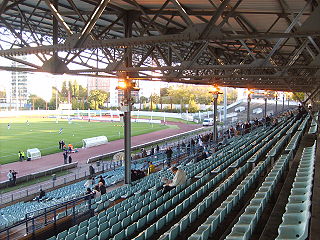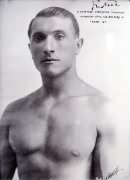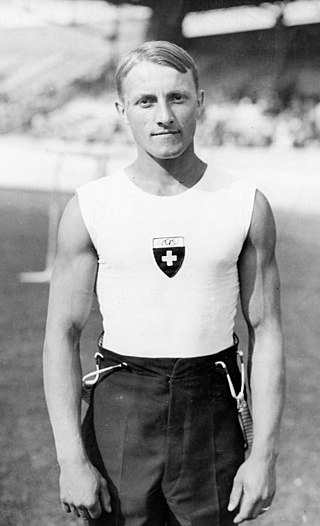
The men's individual all-around, also known as the heptathlon, was one of two gymnastics events on the Gymnastics at the 1908 Summer Olympics programme. As suggested by the alternate name, the competition included seven events with the scores summed to give a final score. Each nation could enter up to 20 gymnasts, with France and Great Britain each entering the maximum. A total of 97 gymnasts from 12 nations competed. The event was won by Alberto Braglia of Italy, the nation's first medal in the men's individual all-around. Silver went to Walter Tysall of Great Britain, the first medal for the nation as well. France's Louis Ségura earned bronze.

The men's artistic individual all-around was an artistic gymnastics event held as part of the gymnastics programme at the 1904 Summer Olympics. It was the second time an all-around event was held at the Olympics. The competition was held on Friday, July 1, 1904 and on Saturday, July 2, 1904. One hundred and nineteen gymnasts from three nations competed. The event was won by Julius Lenhart, an Austrian gymnast living in the United States and competing under the auspices of his Philadelphia-based club. Silver went to Wilhelm Weber of Germany, with bronze to Adolf Spinnler of Switzerland. They were the first medals in the event for each of those nations, as France had swept the medals in 1900.

The men's parallel bars event was part of the gymnastics programme at the 1924 Summer Olympics. It was one of nine gymnastics events and it was contested for the third time after 1896 and 1904. The competition was held on Sunday, July 20, 1924. Seventy-two gymnasts from nine nations competed. The event was won by August Güttinger of Switzerland, the nation's first victory in the event. Robert Pražák of Czechoslovakia and Giorgio Zampori of Italy earned silver and bronze, respectively.

The men's pommel horse event was part of the gymnastics programme at the 1924 Summer Olympics. It was one of nine gymnastics events and it was contested for the third time after 1896 and 1904. The competition was held on Wednesday, July 23, 1924. Seventy gymnasts from nine nations competed, with each nation having an 8-gymnast team. The event was won by Josef Wilhelm of Switzerland, the nation's second victory in the event. With Swiss gymnasts Jean Gutweninger and Antoine Rebetez taking silver and bronze, respectively, it was the second consecutive appearance of the event in which the event's medals were swept.

The men's rings event was part of the gymnastics programme at the 1924 Summer Olympics. It was one of nine gymnastics events and it was contested for the third time after 1896 and 1904. The competition was held on Saturday, July 19, 1924. Seventy gymnasts from nine nations competed, with each nation having an 8-gymnast team. The event was won by Francesco Martino of Italy, the nation's first medal in the event. Robert Pražák and Ladislav Vácha of Czechoslovakia earned silver and bronze, respectively.
The men's vault event was part of the gymnastics programme at the 1924 Summer Olympics. It was one of nine gymnastics events and it was contested for the third time after 1896 and 1904. The competition was held on Monday, July 21, 1924. Seventy gymnasts from nine nations competed. The eight members of each nation's gymnastics team all competed; Czechoslovakia only had six competitors start the vault. The event was won by Frank Kriz of the United States, the nation's second consecutive victory in the event. Jan Koutný and Bohumil Mořkovský of Czechoslovakia took silver and bronze, respectively, the nation's first medals in the event.

The men's horizontal bar event was part of the gymnastics programme at the 1924 Summer Olympics. It was one of nine gymnastics events and it was contested for the third time after 1896 and 1904. The competition was held on Saturday, July 19, 1924. Seventy-two gymnasts from nine nations competed. The event was won by Leon Štukelj of Yugoslavia, with Jean Gutweninger of Switzerland taking silver and André Higelin of France bronze. It was the first medal in the horizontal bar for each of those nations.

The men's artistic individual all-around event was part of the gymnastics programme at the 1924 Summer Olympics. It was one of nine gymnastics events and it was contested for the sixth time. The competition was held from Thursday, 17 July 1924, to Wednesday, 23 July 1924. Seventy-two gymnasts from nine nations competed. Each nation could send up to 8 gymnasts, up from 6 in previous Games. For the first time since 1904, the scores for individual competitors were used to calculate a team score. The men's artistic individual all-around was won by Leon Štukelj of Yugoslavia. Czechoslovakia's Robert Pražák took silver, while Bedřich Šupčík earned bronze. Both nations were making their debut in the event.

The men's parallel bars event was part of the gymnastics programme at the 1928 Summer Olympics. It was one of seven gymnastics events for men and it was contested for the fourth time after 1896, 1904, and 1924. The competition was held on Thursday, August 9, 1928. Eighty-five gymnasts from eleven nations competed, with each nation having a team of up to 8 gymnasts. The event was won by Ladislav Vácha of Czechoslovakia, the nation's first victory in the men's parallel bars. The silver medal went to Josip Primožič of Yugoslavia, with Hermann Hänggi of Switzerland earning bronze.

The men's parallel bars event was part of the gymnastics programme at the 1932 Summer Olympics. It was contested for the fifth time after 1896, 1904, 1924, and 1928. The competition was held on Friday, August 12, 1932. Fifteen gymnasts from six nations competed. Each nation was limited to three gymnasts. The event was won by Romeo Neri of Italy, the nation's first victory in the men's parallel bars. István Pelle earned Hungary's first medal in the event with his silver, while Heikki Savolainen similarly earned Finland's first medal with his bronze.

The men's rings or flying rings event was part of the gymnastics programme at the 1932 Summer Olympics. It was contested for the fifth time after 1896, 1904, 1924, and 1928. The competition was held on Friday, August 12, 1932. Fourteen gymnasts from six nations competed. There were 14 gymnasts from six nations. Each nation was limited to three gymnasts. The event was won by George Gulack of the United States, the nation's first medal in the rings since 1904 and second overall. Another American, Bill Denton, took silver. The United States was not able to complete a repeat of its 1904 sweep, however, as Italy's Giovanni Lattuada beat the third American, Richard Bishop, by one-tenth of a point for the bronze.

The men's pommel horse event was part of the gymnastics programme at the 1932 Summer Olympics. It was contested for the fifth time after 1896, 1904, 1924, and 1928. The competition was held on Thursday, August 11, 1932. Ten gymnasts from five nations competed. Each nation was limited to three gymnasts. The event was won by István Pelle of Hungary, the nation's first medal in the pommel horse. Italy also earned its first medal in the event, with Omero Bonoli's silver. Frank Haubold took bronze, the United States' first medal in the event since 1904.

The men's horizontal bar event was part of the gymnastics programme at the 1932 Summer Olympics. It was contested for the fifth time after 1896, 1904, 1924, and 1928. The competition was held on Thursday, August 11, 1932. Twelve gymnasts from six nations competed. Each nation was limited to three gymnasts. The event was won by Dallas Bixler of the United States, the nation's first victory in the men's horizontal bar since 1904 and second overall. Heikki Savolainen and Einari Teräsvirta of Finland tied for second; the two agreed that Savolainen would take silver and Teräsvirta bronze. They were the first medals for Finland in the horizontal bar.

The men's vault or "long horse vaulting" event was part of the gymnastics programme at the 1932 Summer Olympics. It was contested for the fifth time after 1896, 1904, 1924, and 1928. The competition was held on Wednesday, August 10, 1932. Ten gymnasts from four nations competed. Each nation was limited to three gymnasts. The event was won by Savino Guglielmetti of Italy, the nation's first medal in the event. Americans Al Jochim and Ed Carmichael took silver and bronze, respectively.

The men's rope climbing event was part of the gymnastics programme at the 1932 Summer Olympics. It was contested for the fourth and last time after 1896, 1904, and 1924. The competition was held on Wednesday, August 10, 1932. Five gymnasts from two nations competed. All three medalists were from the host nation, as Americans Raymond Bass, William Galbraith, and Thomas F. Connolly took the honors.

The men's artistic individual all-around event was part of the gymnastics programme at the 1932 Summer Olympics. It was the eighth appearance of the event, which was established in 1900. The competition was held from Monday, August 8, 1932, to Wednesday, August 10, 1932. Twenty-four gymnasts from five nations competed. Each nation could enter a team of 5 gymnasts; Hungary sent only 4. The event was won by Romeo Neri of Italy, the nation's first victory in the event since 1920 and fourth overall. István Pelle of Hungary took silver and Heikki Savolainen of Finland earned bronze; it was the first medal in the event for each nation.

The men's pommel horse event was part of the gymnastics programme at the 1928 Summer Olympics. It was one of seven gymnastics events for men and it was contested for the fourth time after 1896, 1904, and 1924. The competition was held on Wednesday, August 8, 1928. Eighty-eight gymnasts from eleven nations competed, with each nation having a team of 8 gymnasts. The event was won by Hermann Hänggi of Switzerland, the nation's second consecutive victory in the pommel horse. The Swiss nearly repeated their 1924 medal sweep, with 4 of the top 5, but Finland's Heikki Savolainen took bronze between silver medalist Georges Miez and fourth-place finisher Edi Steinemann. It was Finland's first medal in the event.

The men's vault event was part of the gymnastics programme at the 1928 Summer Olympics held in Amsterdam. It was one of seven gymnastics events for men and it was contested for the fourth time after 1896, 1904, and 1924. Scores from the vault event were added to the results from other individual apparatus events to give aggregate scores for the individual and team all-around events. There were 85 competitors from 11 nations. Each nation had a team of 8 gymnasts; three of the 88 men did not start. The event was won by Eugen Mack of Switzerland, the nation's first victory in the event and first medal since 1896. Emanuel Löffler gave Czechoslovakia its second consecutive silver medal. Stane Derganc's bronze was Yugoslavia's first medal in the event.

The men's horizontal bar event was part of the gymnastics programme at the 1928 Summer Olympics. It was one of seven gymnastics events for men and it was contested for the fourth time after 1896, 1904, and 1924. Scores from the horizontal bar event were added to the results from other individual apparatus events to give aggregate scores for the individual and team all-around events. There were 86 gymnasts from 11 nations, with each nation having a team of up to 8 gymnasts. The event was won by Georges Miez of Switzerland, the nation's first victory in the men's horizontal bar. The silver medal went to Romeo Neri of Italy, with Eugen Mack of Switzerland earning bronze.

The men's artistic individual all-around event was part of the gymnastics programme at the 1928 Summer Olympics. It was one of seven gymnastics events for men and was the seventh Olympic men's all-around gymnastic championship. Scores from the individual apparatus events were added to give aggregate scores for the individual all-around; individual all-around scores were similarly summed for the team all-around event. There were 88 competitors from 11 nations. Each nation sent a team of 8 gymnasts. The event was won by Georges Miez of Switzerland, with his countryman Hermann Hänggi taking silver. They were the first medals in the event for Swiss gymnasts since 1904 and the first gold medal ever for a Swiss man in the individual all-around. Defending Olympic champion Leon Štukelj of Yugoslavia finished with the bronze this time, making him the third man to win multiple medals in the event.














